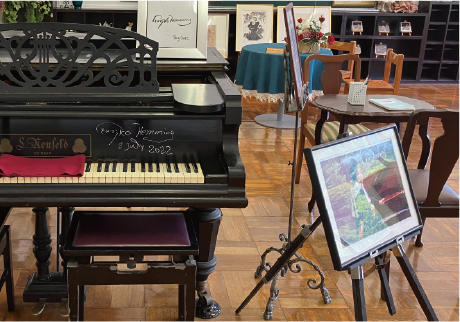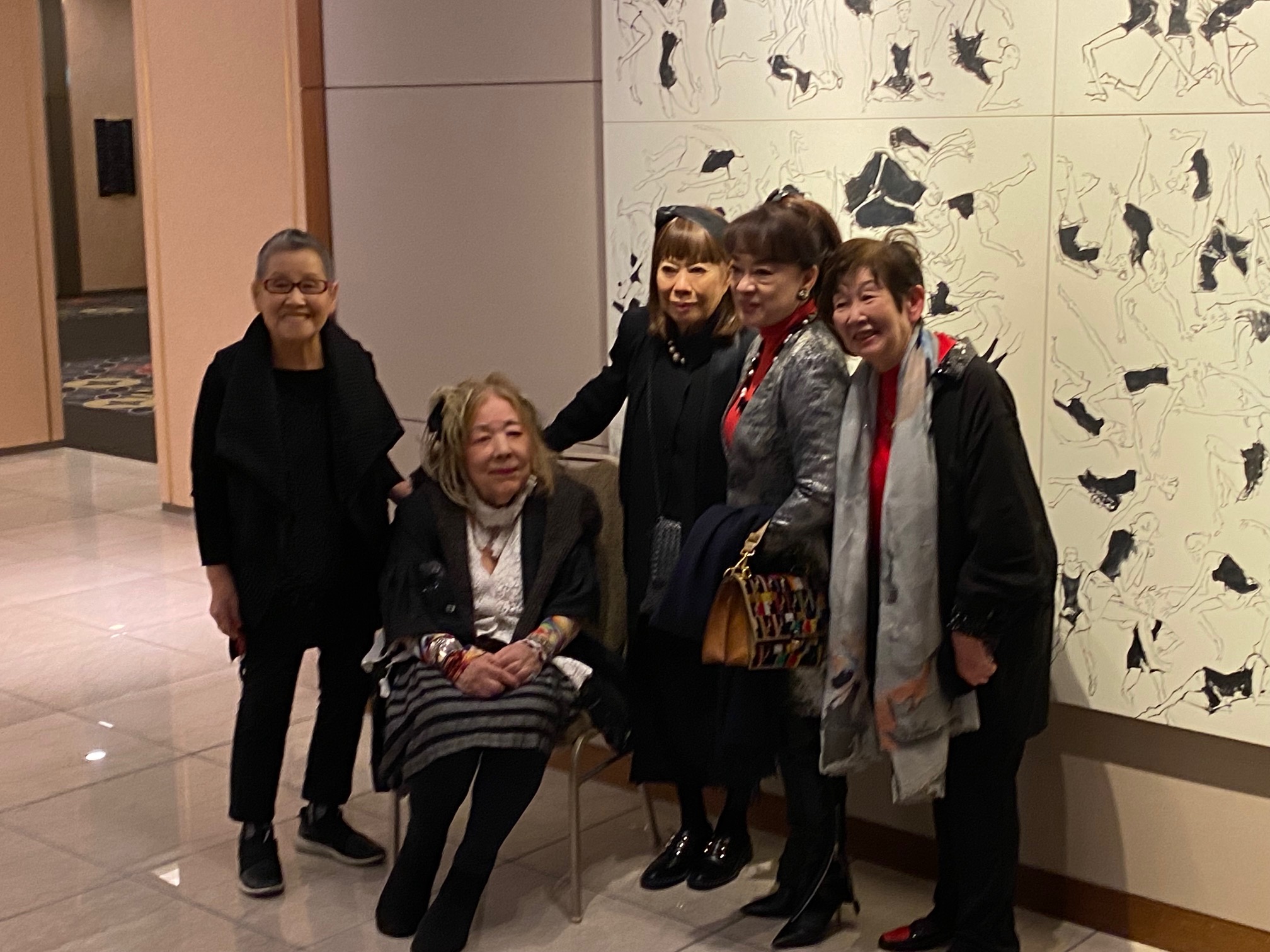フジコ・ヘミングが下仁田で女性の自立を応援している。
Column|2025.4.24
Text_Toshinori Okada
写真提供:日本子守唄協会
今回のコラムは特集に合わせてフジコ・ヘミングにまつわる話を。
場所は群馬県下仁田町。ここに女性の自立を支援する女性村があり、そのなかにねぎぼうず館が設立されている。設立したのは、NPO法人「日本子守唄協会」理事長・西舘好子さん。この協会は、子守歌を通して子どもの心の健全育成や子育て支援、虐待防止に取り組む団体で、設立して25年。ねぎぼうず館は廃校になった小学校の校舎を活用し、そのなかの1室にフジコ・ヘミングが実際に使っていたピアノが置かれた部屋がある。どうして下仁田の「ねぎぼうず館」にフジコさんのピアノが?西舘さんにフジコさんとの出会いを語ってもらった。
「版画家の井上勝江さんの個展に行ったとき、ジュディ・オングさんやコシノヒロコさんとともにフジコさんがいらっしゃいました。その場でフジコさんが『あなた、私のピアノはいらない?』とおっしゃって。まだ初対面だったのに、それはまさか・まさかともう驚きました」。
以後何回か手紙のやりとりをするなかで突然、フジコさんから電話がかかってきた。「フジコさんは『ピアノとお金、どちらがいい?』と聞かれたこともあります。『もちろん、ピアノが良いに決まっています』とお答えしました。しばらく日があいて、もう気がかわってしまわれたのかなと思っていた頃、本当にピアノがやって来たのです!」。届いたピアノはもともとベルリンの家にあり、後に日本の自宅で使っていた100年物のピアノだという。「フジコさんは『このピアノは私より価値があるわよ』とおっしゃっていました(笑)」。
その後「ねぎぼうず館」にピアノとともに、フジコさんが描いたアートを多く収集していた方から届いた絵を飾り、フジコ・ヘミングの部屋ができた。いまではピアノとともにフジコさんが描いた絵画が飾られている。
「あるときフジコさんがおっしゃったんです。『ピアノって何千人もの前で弾くものじゃなく、自然の中にある小さな場所で、数人、数十人のために弾くもの。私は自然に囲まれた小さな場所でピアノを弾きたい』と。私はすごく嬉しくって、ぜひ下仁田でピアノを弾いてくださいとお願いしましたが、それは叶うことはありませんでした」。
「ピアノの前で泣いているファンの方もいらっしゃいます。そのような光景を目にし、フジコさんて本当に心を届けられる素晴らしいピアニストだったんだと思います。何でピアノをくれたのかいまだに分からないんです。何か感じるところがあったのかもしれません。私もフジコさんの気持ちを大切にして下仁田に通い続けています。」
フジコさんは海外で、そして日本で、さまざまな苦労を経験してきた一人の女性として西舘さんの活動に賛同したのではないか。そんなフジコさんの気持ちは、いまも下仁田で感じることができるようだ。
Fujiko Hemming supports women’s independence in Shimonita.
In keeping with this issue’s theme, here’s a story tied to Fujiko Hemming.
In Shimonita, Gunma Prefecture, there’s a facility called Josei Mura (Women’s Village), which supports women’s independence, including single mothers. It was founded by the Nippon Lullaby Association, led by critic Yoshiko Nishidate, who promotes child development, parenting support, and abuse prevention through lullabies. Housed in a former school, Josei Mura now holds a special room with a piano once played by Fujiko Hemming. So how did it get there? Nishidate-san shared the story.
“When I was planning Josei Mura, I went to a solo show by printmaker Katsue Inoue. Fujiko was there, along with Judy Ongg and Hiroko Koshino. Out of nowhere, she said, ‘I’d like to support your project.’ Then she asked, ‘Would you like my piano?’ It was our first meeting—I was stunned.”
They exchanged letters, and one day Fujiko called unexpectedly. “She asked, ‘Would you rather have the piano or money?’ I said the piano. Time passed, and I thought she’d changed her mind—but then it arrived!” The piano had once been in her Berlin home and later at her home in Japan. “She laughed and said, ‘This piano is more valuable than I am.’”
And so, a special Fujiko Hemming room was created in the Women’s Village, where her beloved piano now stands with her artwork.
“Fujiko once told me, ‘The piano isn’t meant to be played for thousands of people. It should be played in a small chapel in nature, for just a few—or a few dozen—people. I would want to play the piano in a place like that.” I was so moved and told her, ‘Please come and play here someday.’” But that never came to be.
“Some visitors come here and cry in front of her piano. In those moments, I’m reminded of how special she was.”
As a woman who endured many hardships both overseas and in Japan, Fujiko deeply connected with Nishidate-san’s mission—and her spirit still lives on in Shimonita.

女性村(ねぎぼうず館)のフジコさんのピアノには直筆サインが入れられている。

フジコさんの部屋では演奏会も行われる。

女性村(ねぎぼうず館)にあるフジコさんの部屋。

左から井上勝江さん、フジコさん、コシノ・ヒロコさん、
ジュディ・オングさん、西舘好子さん。


